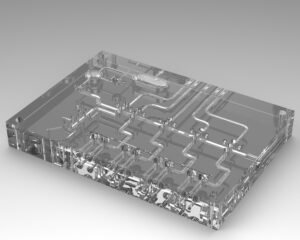Vespel is a high-performance polyimide material known for its exceptional physical, thermal, and chemical properties. Developed by DuPont, Vespel has become an indispensable material in various high-stress, high-temperature applications across multiple industries. This article delves into the history of Vespel, its unique properties, and its broad range of applications, highlighting what makes this material so valuable in modern technology.
Invention & History
Vespel was developed by DuPont in the 1960s as part of their ongoing research into advanced polymer materials. The need for materials that could withstand extreme conditions in aerospace and other high-tech industries drove this innovation. DuPont’s chemists sought to create a polymer that combined the best properties of plastics and metals—lightweight yet capable of enduring high temperatures and mechanical stress.
The result was Vespel, a polyimide material that surpassed existing polymers in performance. Introduced commercially in the late 1960s, Vespel quickly gained a reputation for its ability to perform in environments where other materials would fail. Its development marked a significant milestone in materials science, providing engineers and designers with a versatile and reliable material for challenging applications.
Physical Properties
Vespel’s physical properties make it stand out among other high-performance polymers. It is renowned for its excellent mechanical strength and durability, even at elevated temperatures. Vespel exhibits a high tensile strength, with certain grades capable of withstanding over 15,000 psi. This strength is complemented by its impressive toughness and resilience, which allow it to endure mechanical stress and impact without cracking or breaking.
Another notable physical property is Vespel’s low wear and friction characteristics. This makes it an ideal material for applications involving sliding or rotating parts, where reducing wear is critical to the longevity and reliability of components. Vespel’s low coefficient of friction ensures smooth operation, reducing the need for frequent maintenance and replacement of parts.
Thermal Properties
Vespel’s thermal properties are perhaps its most remarkable feature. It can withstand continuous use temperatures of up to 550°F (288°C) and intermittent use temperatures as high as 900°F (482°C). This high thermal stability is crucial for applications in aerospace, automotive, and industrial sectors where materials are subjected to extreme heat.
In addition to its heat resistance, Vespel maintains its mechanical properties across a wide temperature range. Unlike many polymers that become brittle at low temperatures, Vespel retains its toughness and flexibility even in cryogenic conditions. This makes it suitable for use in both high-heat and deep-freeze environments, demonstrating unparalleled versatility.
Chemical Properties
Vespel’s chemical resistance further enhances its suitability for demanding applications. It is highly resistant to a variety of chemicals, including solvents, fuels, and lubricants. This resistance ensures that Vespel components do not degrade or swell when exposed to harsh chemicals, maintaining their integrity and performance over time.
This chemical resistance extends to its low outgassing properties, making Vespel an ideal material for use in vacuum environments, such as those found in space applications. The material’s stability in such conditions ensures that it does not release gases that could contaminate sensitive equipment or compromise the vacuum.
Applications in Modern Industries
Vespel’s unique combination of properties has led to its widespread adoption across multiple industries. Its ability to perform under extreme conditions makes it invaluable in applications where reliability and longevity are critical.
Aerospace Industry
The aerospace industry was one of the earliest adopters of Vespel. Its high-temperature stability and low outgassing properties make it ideal for components used in spacecraft and aircraft. Vespel is commonly used in bushings, seals, and insulators, where it can withstand the harsh conditions of space and high-altitude flight. Its lightweight nature also contributes to overall weight reduction, enhancing fuel efficiency and performance.
Automotive Industry
In the automotive sector, Vespel is used in critical engine components that require high heat resistance and low wear. Applications include valve seats, thrust washers, and fuel system components. Vespel’s durability and stability help improve the efficiency and longevity of engines, contributing to better performance and reduced maintenance costs.
Industrial Applications
Vespel finds extensive use in industrial applications that demand high-performance materials. In the semiconductor industry, it is used in wafer processing equipment and test sockets due to its thermal stability and chemical resistance. In oil and gas, Vespel components are used in drilling equipment and valves, where they must endure extreme pressures and corrosive environments.
Electrical and Electronics
The electrical and electronics industries benefit from Vespel’s excellent insulating properties. It is used in connectors, insulators, and other components that require reliable performance at high temperatures. Vespel’s low dielectric constant and dissipation factor make it suitable for high-frequency applications, ensuring signal integrity and performance.
Medical Devices
In the medical field, Vespel is used in surgical instruments and diagnostic equipment. Its biocompatibility, combined with its mechanical and thermal properties, makes it suitable for devices that must be sterilized and used in precise, high-stress applications. Vespel components contribute to the reliability and safety of medical instruments, enhancing patient care.
Supporting Innovation
Vespel polyimide stands as a testament to the advancements in materials science and engineering. Its unique combination of physical, thermal, and chemical properties has made it an indispensable material in a wide range of industries. From aerospace and automotive to medical devices and electronics, Vespel’s reliability and performance under extreme conditions continue to drive innovation and improve the efficiency and longevity of critical components.
The development of Vespel by DuPont in the 1960s marked a significant milestone, providing engineers and designers with a material that could meet the challenges of modern technology. Today, Vespel remains at the forefront of high-performance polymers, embodying the pinnacle of what advanced materials can achieve. Its enduring value lies in its ability to deliver consistent, reliable performance in the most demanding environments, making it an essential material for the future of technology and industry.
Are you looking for a supplier that knows how to work with Vespel to produce quality parts that meet your custom specifications? Contact the experts at Piedmont CMG to get a free quote and DFM feedback on your project.





